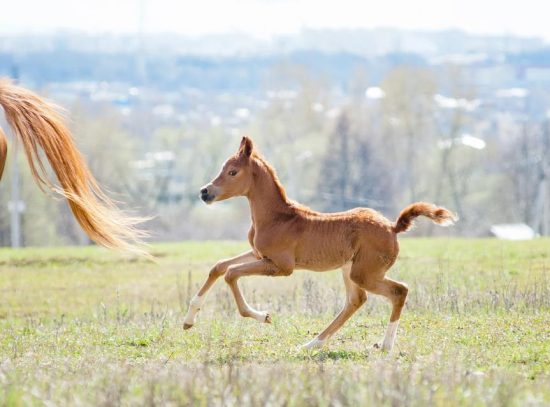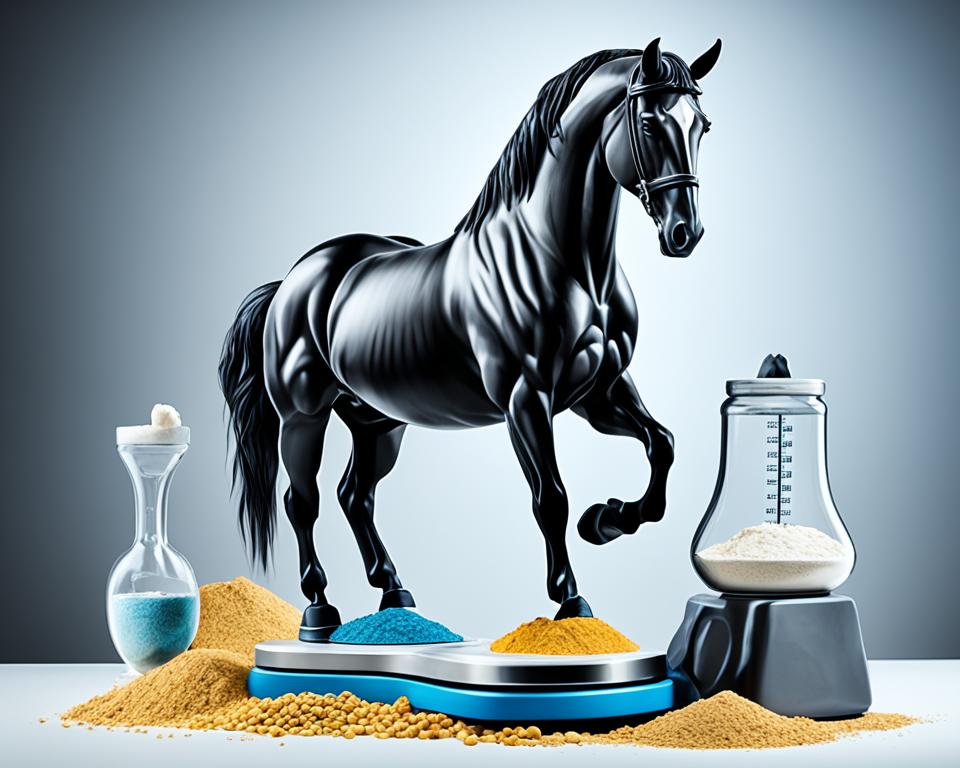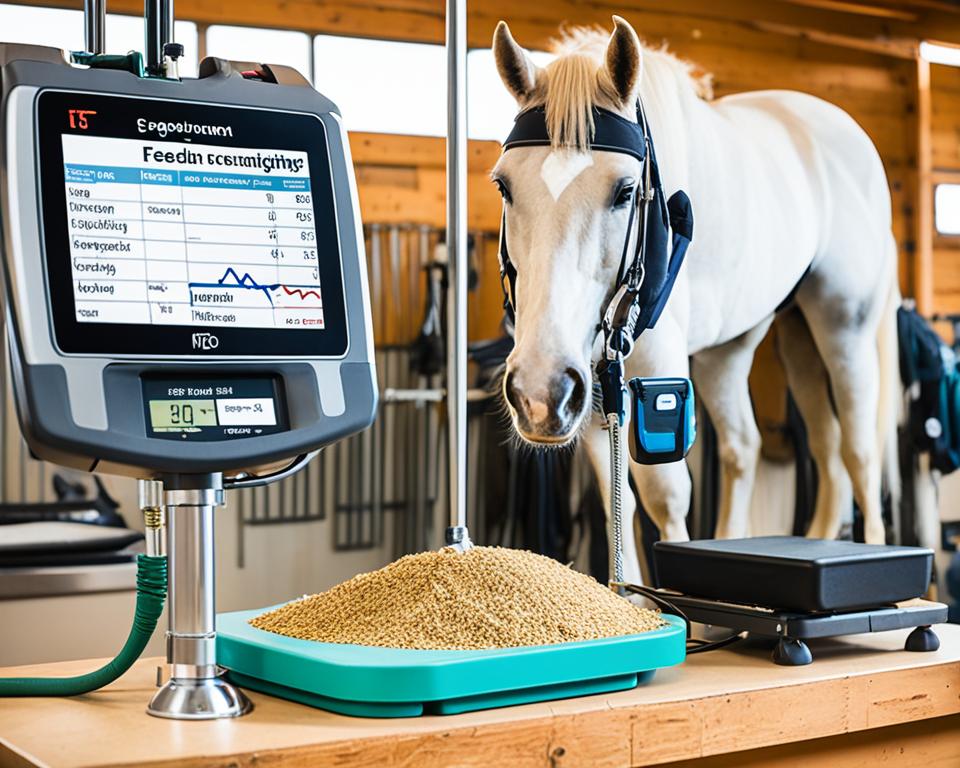How Much Does a Horse Weigh? Find the Average Weight.
Discover the average weight of various horse breeds and learn what factors influence how much a horse weighs. Get all your equine weight queries answered.

Have you ever wondered just how much does a horse weigh? It’s a question many equestrians and horse enthusiasts have pondered. The weight of a horse is not only a matter of curiosity but also of great importance for their health and well-being. Controlling a horse’s weight is crucial, as both underweight and overweight horses can face significant health risks.
Obesity, just like in humans, can lead to a range of health issues for horses. Conditions such as laminitis, Equine Metabolic Syndrome, and poor cardiovascular health can be the result of excessive weight. On the other hand, underweight horses may have a weakened immune system, poor performance, and overall compromised well-being.
So, how can you ensure that your horse is at an ideal weight? Consultation with a veterinarian is essential, as they can provide expert guidance tailored to your horse’s specific needs. In addition, using weight tapes and body condition scoring can help you monitor and maintain your horse’s weight within a healthy range.
In this article, we will delve into the topic of horse weight, exploring the average weight of horses and the factors that influence it. We will also discuss the importance of maintaining an ideal weight for your horse’s overall health and well-being. So, let’s discover how much a horse really weighs and why it matters!
Understanding Horse Weight Variables

Several variables can affect a horse’s weight. It is essential to consider various factors that influence equine weight. These variables include breed, diet, exercise, and health conditions. The breed of a horse plays a significant role in determining its weight. Different breeds have distinct sizes and body types, resulting in variations in weight. For instance, light horse breeds like Thoroughbreds and Arabians tend to be smaller and lighter, while draft horse breeds such as Clydesdales and Percherons are larger and heavier.
Diet directly influences a horse’s weight. The type and quantity of food a horse consumes can contribute to weight gain or loss. Diets high in fat or sugar, such as rich pasture or high-quality grain, can lead to weight gain. It is crucial to provide horses with a balanced diet that meets their nutritional needs and matches their activity level.
Exercise is another critical factor in maintaining a healthy weight for horses. Regular physical activity helps build muscle and burn fat, contributing to a more balanced weight. The type and intensity of exercise can vary based on the horse’s type and purpose. Different horse types, such as racehorses or pleasure horses, may require specific exercise regimes to meet their fitness goals.
Various health conditions can impact a horse’s weight. Dental problems, metabolic disorders, and other underlying medical conditions can lead to weight fluctuations. It is essential to monitor horses’ health regularly and address any health issues that may contribute to weight changes.
Key Factors That Influence a Horse’s Weight
When it comes to understanding a horse’s weight, there are several key factors that come into play. These factors include breed, diet, exercise, health, and age. Each of these elements can significantly influence a horse’s weight and overall well-being.
Breed
The breed of a horse significantly influences its weight, as different breeds have varying genetic predispositions for size and body mass. For example, draft horses like Clydesdales are naturally much heavier, often weighing between 1,800 to 2,200 pounds, due to their large bone structure and muscle mass. In contrast, lighter breeds like Arabians or Thoroughbreds typically weigh between 900 to 1,200 pounds. Understanding the typical weight range for a horse’s breed is crucial for assessing whether it is at a healthy weight.
Diet
A horse’s diet is a critical factor in maintaining its weight. Horses require a balanced diet that includes sufficient quantities of forage, such as hay or grass, supplemented with grains, vitamins, and minerals to meet their nutritional needs. Overfeeding or underfeeding can lead to weight issues, such as obesity or malnutrition. The quality and type of food, along with the horse’s access to fresh water, play essential roles in ensuring that a horse maintains an appropriate and healthy weight.
Exercise
Regular exercise is vital for a horse’s overall health and weight management. Physical activity helps burn calories, build muscle, and maintain a healthy metabolism. Horses that are frequently exercised, whether through riding, training, or free movement in pastures, are more likely to maintain a stable weight. Conversely, horses with limited exercise opportunities may gain excess weight, leading to health problems like laminitis or metabolic disorders.
Health
A horse’s health status greatly impacts its weight. Conditions such as dental issues, parasites, metabolic disorders, or chronic illnesses can affect a horse’s ability to eat properly or digest nutrients efficiently, leading to weight loss or gain. Regular veterinary check-ups and prompt treatment of health issues are essential to ensure that a horse remains at a healthy weight. Monitoring for signs of illness and maintaining a proactive approach to health care can prevent weight-related problems.
Age
Age is another key factor that influences a horse’s weight. Younger horses, especially foals and yearlings, are in stages of rapid growth and typically require more nutrients to support their development. Mature adult horses often have more stable weight patterns if they are well-cared for. However, older horses may experience weight loss due to factors like decreased digestive efficiency, dental problems, or age-related health issues. Adjusting the diet and care practices to accommodate the horse’s life stage is crucial for maintaining optimal weight throughout its life.
The Weight Spectrum Across Different Horse Breeds
When it comes to horse breeds, there is a vast spectrum in terms of size and weight. From miniature horses to draft horses, each breed has its own unique characteristics. Light horse breeds, such as Thoroughbreds and Arabians, tend to be smaller and lighter compared to other breeds. These horses are known for their agility and speed, making them ideal for various equestrian disciplines.
On the other end of the spectrum, we have draft horse breeds like Clydesdales and Percherons. These horses are much larger and heavier, often used for heavy pulling or agricultural work. They possess incredible strength and power, making them an impressive sight to behold.
It’s important to note that the average weight of different horse breeds can vary significantly. While there are general ranges for each breed, individual horses may fall outside of these averages depending on their unique characteristics. Factors such as height, build, and overall body composition can also contribute to variations in weight.
To illustrate the weight spectrum across different horse breeds, take a look at the table below:
| Breed | Average Weight Range (pounds) |
|---|---|
| Miniature Horse | 100 – 300 |
| Quarter Horse | 900 – 1,200 |
| Thoroughbred | 900 – 1,200 |
| Arabian | 800 – 1,000 |
| Clydesdale | 1,600 – 2,200 |
| Percheron | 1,800 – 2,600 |
This table provides a glimpse into the average weight ranges for different horse breeds. However, it’s important to remember that these are just averages, and individual horses may vary. Understanding the weight spectrum across different horse breeds can help horse owners and enthusiasts gain a better appreciation for the diversity within the equine world.
The Growth Stages and Weight of Young Horses
What Does a Foal Weigh at Birth?

Young horses go through various growth stages that impact their weight. A foal weighs approximately 10% of its mother’s weight at birth. This weight can range from 50 to 150 pounds depending on the breed and size of the mare. The foal’s weight at birth is an important indicator of its health and vitality. A healthy foal should be able to stand and nurse shortly after birth.
Understanding Yearling Weight Increases
As young horses continue to grow, their weight increases significantly during the yearling stage. Yearlings experience a growth spurt, adding both height and weight. On average, a yearling’s weight can increase by 200 to 400 pounds compared to their weight at birth. This growth is fueled by a combination of genetics, nutrition, and proper care.
| Age | Weight Range (in pounds) |
|---|---|
| Birth | 50-150 |
| One Year (Yearling) | 250-550 |
| Two Years (Two-Year-Old) | 600-900 |
The weight gain during the yearling stage is crucial for the horse’s development. It helps build a sturdy foundation for future growth and ensures that the horse reaches its full potential. It’s important to provide appropriate nutrition and regular veterinary care during this stage to support healthy growth.
A Closer Look at How Diet Affects Horse Weight
Diet plays a crucial role in determining a horse’s weight. The type and amount of food that a horse consumes can directly contribute to weight gain or loss.
Regarding diet and horse weight, it’s essential to provide your horse with a balanced nutritional plan that caters to its specific needs. A high-fat or high-sugar diet, such as rich pasture or high-quality grain, can quickly lead to weight gain if not properly managed. When planning your horse’s diet, it’s important to consider its activity level. Horses with more demanding jobs, such as competition horses or broodmares, have higher caloric requirements than pleasure horses ridden once a week.
Equine nutritionists recommend a diet primarily consisting of forage, such as hay or pasture, as it provides essential fiber and nutrients while promoting a healthy weight. However, it’s important to carefully monitor the quality and quantity of forage to avoid excessive weight gain. Horses may require supplemental feed in addition to forage to meet their nutritional needs. These feeds should be carefully selected and balanced based on the individual horse’s requirements, activity level, and weight management goals.
Consulting with a veterinarian or equine nutritionist can help create a tailored diet plan that supports your horse’s overall health and weight goals. Regularly assessing your horse’s body condition score and adjusting the diet accordingly is crucial in maintaining a healthy weight.
How Much Does a Horse Weigh?
When it comes to the weight of horses, there are various factors that influence their overall mass. The average weight of a horse typically falls between 900 and 1,200 pounds. However, it’s important to note that this can vary based on several factors, including breed, diet, exercise, and health.
For instance, miniature horses and small ponies tend to be much lighter, weighing between 100 and 600 pounds. On the other end of the spectrum, draft horses are significantly heavier, with weights exceeding 1,800 pounds.

It’s essential to keep in mind that individual horses may deviate from these average weights due to their unique characteristics. The weight of a horse plays a crucial role in their overall health and well-being, influencing factors such as their exercise capacity, diet requirements, and performance potential.
| Breed | Weight Range (in pounds) |
|---|---|
| Miniature Horses and Small Ponies | 100-600 |
| Light Horse Breeds | 900-1,200 |
| Draft Horses | 1,800+ |
As horse owners and caregivers, it is crucial to monitor and manage the weight of our equine companions effectively. This involves paying attention to their diet, exercise routine, and overall health to ensure they maintain a healthy weight range. By doing so, we can help promote their well-being and longevity.
Exercising Horses: How It Shapes Their Weight
Exercise plays a significant role in shaping a horse’s weight and overall body composition. Regular physical activity helps build muscle and burn fat, leading to a healthier weight. When horses engage in exercise, their muscles are strengthened, which can increase their weight due to muscle mass. At the same time, exercise also helps burn excess fat, prevent obesity, and maintain a lean physique for the horse.
The impact of physical activity on equine weight is twofold. Exercise contributes to weight gain in the form of muscle, but it also aids in weight loss by burning calories and reducing excess fat. Maintaining an ideal weight is essential to balance muscle development and fat reduction.
Different exercise regimes may be necessary depending on the horse’s type and purpose. Racehorses, for example, require intense training and exercise routines to build endurance and speed. On the other hand, pleasure horses may engage in low to moderate-intensity exercises to maintain their fitness level and overall well-being.
| Type of Horse | Exercise Regime |
|---|---|
| Racehorses | Intense training, including galloping, trotting, and interval workouts |
| Pleasure Horses | Trail riding, light jumping, and regular turnout in a pasture or paddock |
| Dressage Horses | Daily dressage training, including various movements and exercises |
It’s important to tailor the exercise regime to the specific needs and abilities of the horse. Overexertion or inadequate exercise can result in negative health effects and may even lead to weight-related issues.
Monitoring Health and Weight in Equines
Monitoring the health and weight of horses is a critical aspect of responsible horse ownership. By closely observing their weight and overall well-being, you can identify any potential health issues and take appropriate action. Weight-related health issues can arise when horses are underweight or overweight, making it essential to maintain a healthy weight for optimal equine health.
Recognizing Signs of Weight-Related Health Issues
Being aware of the signs and symptoms of weight-related health issues is crucial in identifying and addressing potential problems. For example, laminitis, a painful and debilitating condition affecting the hooves, is closely associated with obesity in horses. Other common health issues related to weight include Equine Metabolic Syndrome and poor cardiovascular health. Additionally, horses that are underweight may exhibit a suppressed immune system and poor performance. By recognizing these signs, you can take early action to prevent further complications.
Using Weight as a Metric for Equine Health
Weight serves as an important metric for assessing equine health. It provides insights into their overall well-being and can help identify any underlying medical concerns. By regularly tracking your horse’s weight, you can detect changes that may indicate a shift in their health status. Monitoring weight in conjunction with other health indicators, such as body condition scoring, gives a more comprehensive understanding of your horse’s health and aids in making informed decisions regarding their care.

Measuring and Estimating Horse Weight Accurately
Accurately measuring and estimating a horse’s weight is crucial for proper management and care. While livestock scales provide the most precise measurement, they can be expensive and impractical for regular use. Thankfully, there are alternative techniques such as using weight tapes and equine scales.
Weight tapes are a commonly used tool for estimating a horse’s weight. They work by measuring the circumference of the horse’s girth and providing an estimate based on established formulas. To ensure accurate results, it’s important to place the weight tape in the correct location on the horse’s body.
Equine scales are another effective method for measuring a horse’s weight. These scales are specifically designed to accommodate horses and provide accurate readings. Equine scales are often found in veterinary clinics, horse shows, or larger equestrian facilities.
FAQs on How much does a horse weigh
What factors influence a horse’s weight?
Several factors can influence a horse’s weight, including breed, diet, exercise, health, and age.
How does breed impact a horse’s weight?
Different horse breeds have different sizes and body types, leading to variations in weight.
How does diet affect a horse’s weight?
The type and amount of food a horse consumes can contribute to weight gain or loss.
How does exercise contribute to a horse’s weight?
Regular exercise helps build muscle and burn fat, leading to a healthier weight.
What health factors can affect a horse’s weight?
Certain health conditions, such as dental problems or metabolic disorders, can impact a horse’s weight.
What are the key factors that influence a horse’s weight?
Breed, diet, exercise, health, and age are key determinants of a horse’s weight.
How much does a light horse breed typically weigh?
Light horse breeds, such as Thoroughbreds and Arabians, tend to be smaller and lighter in weight.
What is the average weight of draft horse breeds?
Draft horse breeds, like Clydesdales and Percherons, can weigh over 1,800 pounds on average.






